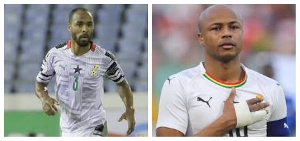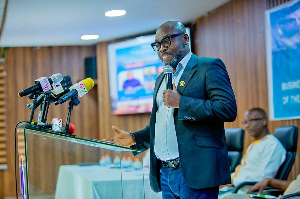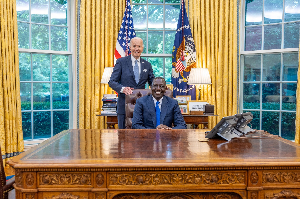- Home - News
- TWI News | TV
- Polls
- Year In Review
- News Archive
- Crime & Punishment
- Politics
- Regional
- Editorial
- Health
- Ghanaians Abroad
- Tabloid
- Africa
- Religion
- Election 2020
- Coronavirus
- News Videos | TV
- Photo Archives
- News Headlines
- Press Release
General News of Monday, 15 November 1999
Source: JoFM
Four hundred trokosis liberated in Akatsi and Ketu districts
Mr. Francis Emile Short, Commissioner of Human Rights and Administrative Justice (CHRAJ), said the liberation of trokosis was not an attempt to impose Christianity on practitioners of traditional religion.
Trokosi is the practice under which maidens are held at shrines in atonement for offences committed by their relatives. He said the retention of the practice could not be justified on the mere assertion that it is part of culture. Mr. Short was speaking at a durbar at Akatsi in the Volta region, where 400 women from 100 small shrines, in the Akatsi and Ketu districts were liberated. The ceremony, the 11th in a series was organized by the International Needs, a non-governmental organization (NGO) spear-heading the abolition of the system. Trokosi is practiced in Volta, Greater Accra, and parts of Eastern regions.
Mr. Short said the issue at stake, is neither religion nor culture but simply one of human rights and called on law enforcement agencies to enforce the Criminal Code (Amendment) Act, 1998 that prohibits everybody from subjecting anyone to any form of ritual or customary servitude. He said failure to implement the law would undermine the legitimacy and the public confidence in Parliament and the law enforcement agencies themselves.
Mr. Wisdom Mensah, Programmes Co-ordinator of International Needs, said last year Parliament passed into an Act the bill against ritual servitude in Ghana and questioned when this law is going to be enforced. Mr. Mensah called on the law enforcement agencies to closely monitor the activities of Wenu of Avenorpeme traditional area, Dasuma of Big Ada, the Agave Shrines in South Tongu district, the Afife and the Klikor shrines both in Ketu districts, who have refused to liberate their trokosis.
Togbe Atsu Eklo, Spokesman for the priests, said the gods agreed that some aspects of the practice should be modified after consultation. He confirmed that even their great-great grandfathers, who were the owners of the gods, in those days, received animals from offenders, adding that the ceremony was only a reversion to the original practice.
Togbe Eklo said their decision to liberate the women was taken voluntarily without anybody's influence and assured the government of their commitment to the process. One special thing about the ceremony was that it was the first time that as many as 100 trokosi shrines had come together to set free those they had held in bondage for several years. Among the liberated women were 15 young girls aged between four and 10 years. The youngest among them, Salome Agumenu, four, was brought to Avorvoe shrine at the age of two because her grandfather had sex with a trokosi of that shrine. The priests removed garlands, black and red stoles worn by trokosis from the women to signify the end of their slavery.










